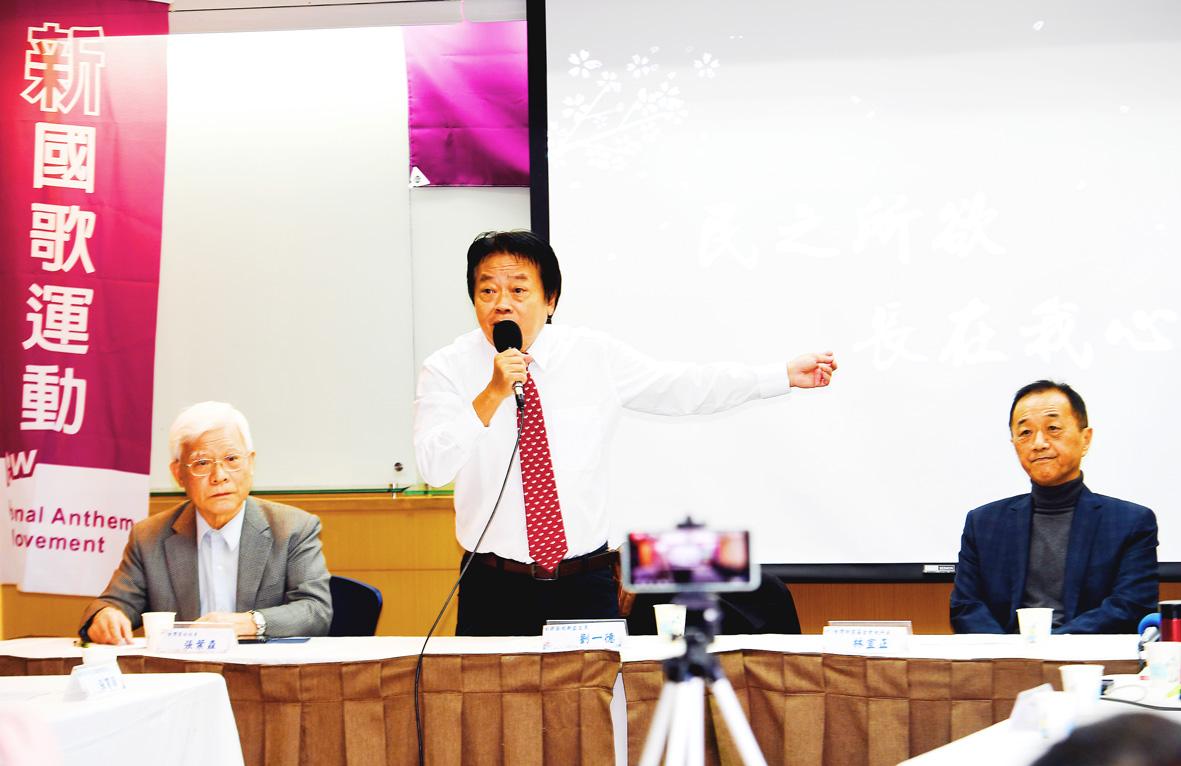The Taiwan Solidarity Union (TSU) yesterday at a news conference called for replacing the national anthem.
The current national anthem was based on the words of Republic of China (ROC) founder Sun Yat-sen (孫逸仙) in 1924 for use by the ROC Military Academy (then known as the Whampoa Military Academy), and was later adopted by the Chinese Nationalist Party (KMT) as its party song, TSU Chairman Lau I-te (劉一德) said.
The song was then adopted as the ROC national anthem by an executive order in 1930, he said.

Photo: CNA
“Singing this anthem is enough to make people crazy. [President] Tsai Ing-wen (蔡英文) has been in office for five years now — it is ridiculous that we are still singing this anthem,” he said.
Taiwan New Constitution Foundation executive director Lin Yi-cheng (林宜正) and Taiwan Society chairman Chang Yeh-shen (張葉森) also attended the new conference.
Liu said the group was planning 15 to 20 more conferences nationwide in the coming months.
The inseparability of the anthem from the KMT is evident in its opening lines: “Three principles of the people, the foundation of our party. Through this, we establish the republic,” he said.
“Not all Taiwanese are members of the KMT, but we all have to sing along. That is quite strange,” he added.
During the administration of former president Chen Shui-bian (陳水扁), the Democratic Progressive Party lacked a legislative majority, and thus was unable to change the anthem, but this is no longer the case under the current administration, he said, urging Tsai to take action.
Lin said he had not sung the national anthem since learning about its origins in high school, and that he, like many other Taiwanese, had no emotional connection to the anthem.
The anthem was adopted by a non-democratic government 83 years ago and is out of touch with modern-day Taiwan, which has experienced 30 years of democratization, he said, adding that 83 percent of Taiwanese see themselves as “Taiwanese,” and not “Chinese.”
“Do not underestimate the importance of a national anthem’s development. Look at France’s La Marseillaise and the US’ Star Spangled Banner — those anthems can rouse emotions,” he said.
Maintaining the “status quo” in the Taiwan Strait should be only an interim solution, he said, adding that a new national anthem could better represent Taiwanese.
Chang said the current national anthem is “disgraceful” and has caused a rift among Taiwanese.
“Even the president refuses to utter the line ‘the foundation of our party’ when singing the anthem. Taiwanese need an anthem they can proudly sing,” he said.

The manufacture of the remaining 28 M1A2T Abrams tanks Taiwan purchased from the US has recently been completed, and they are expected to be delivered within the next one to two months, a source said yesterday. The Ministry of National Defense is arranging cargo ships to transport the tanks to Taiwan as soon as possible, said the source, who is familiar with the matter. The estimated arrival time ranges from late this month to early next month, the source said. The 28 Abrams tanks make up the third and final batch of a total of 108 tanks, valued at about NT$40.5 billion

Two Taiwanese prosecutors were questioned by Chinese security personnel at their hotel during a trip to China’s Henan Province this month, the Mainland Affairs Council (MAC) said yesterday. The officers had personal information on the prosecutors, including “when they were assigned to their posts, their work locations and job titles,” MAC Deputy Minister and spokesman Liang Wen-chieh (梁文傑) said. On top of asking about their agencies and positions, the officers also questioned the prosecutors about the Cross-Strait Joint Crime-Fighting and Judicial Mutual Assistance Agreement, a pact that serves as the framework for Taiwan-China cooperation on combating crime and providing judicial assistance, Liang

A group from the Taiwanese Designers in Australia association yesterday represented Taiwan at the Midsumma Pride March in Melbourne. The march, held in the St. Kilda suburb, is the city’s largest LGBTQIA+ parade and the flagship event of the annual Midsumma Festival. It attracted more than 45,000 spectators who supported the 400 groups and 10,000 marchers that participated this year, the association said. Taiwanese Designers said they organized a team to march for Taiwan this year, joining politicians, government agencies, professionals and community organizations in showing support for LGBTQIA+ people and diverse communities. As the first country in Asia to legalize same-sex

MOTIVES QUESTIONED The PLA considers Xi’s policies toward Taiwan to be driven by personal considerations rather than military assessment, the Epoch Times reports Chinese President Xi Jinping’s (習近平) latest purge of the Chinese People’s Liberation Army (PLA) leadership might have been prompted by the military’s opposition to plans of invading Taiwan, the Epoch Times said. The Chinese military opposes waging war against Taiwan by a large consensus, putting it at odds with Xi’s vision, the Falun Gong-affiliated daily said in a report on Thursday, citing anonymous sources with insight into the PLA’s inner workings. The opposition is not the opinion of a few generals, but a widely shared view among the PLA cadre, the Epoch Times cited them as saying. “Chinese forces know full well that